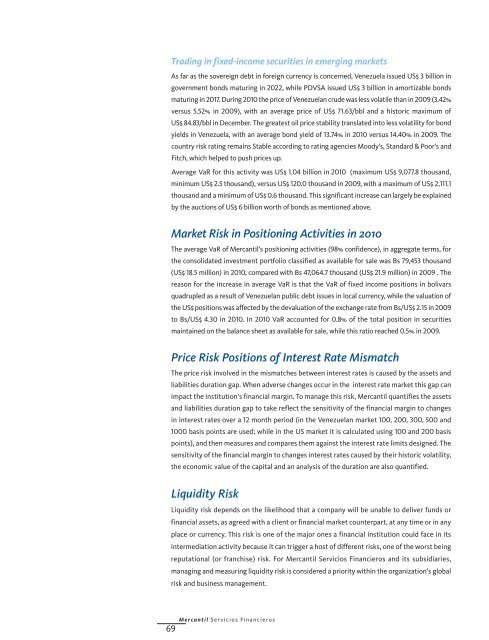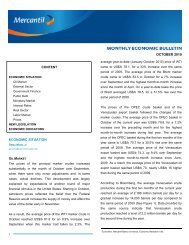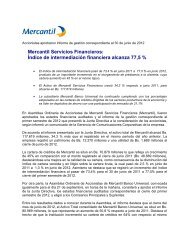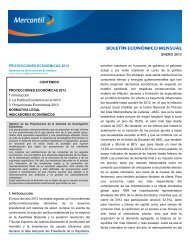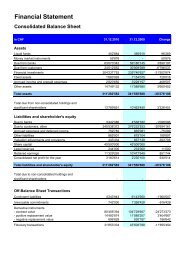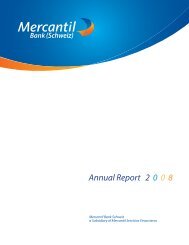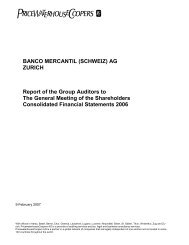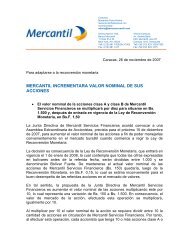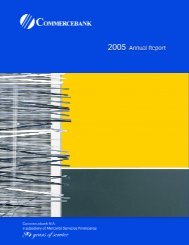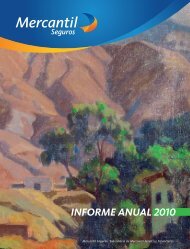ANNUAL REPORT 2010
ANNUAL REPORT 2010
ANNUAL REPORT 2010
Create successful ePaper yourself
Turn your PDF publications into a flip-book with our unique Google optimized e-Paper software.
Trading in fixed-income securities in emerging markets<br />
As far as the sovereign debt in foreign currency is concerned, Venezuela issued US$ 3 billion in<br />
government bonds maturing in 2022, while PDVSA issued US$ 3 billion in amortizable bonds<br />
maturing in 2017. During <strong>2010</strong> the price of Venezuelan crude was less volatile than in 2009 (3.42%<br />
versus 5.52% in 2009), with an average price of US$ 71.63/bbl and a historic maximum of<br />
US$ 84.83/bbl in December. The greatest oil price stability translated into less volatility for bond<br />
yields in Venezuela, with an average bond yield of 13.74% in <strong>2010</strong> versus 14.40% in 2009. The<br />
country risk rating remains Stable according to rating agencies Moody’s, Standard & Poor’s and<br />
Fitch, which helped to push prices up.<br />
Average VaR for this activity was US$ 1.04 billion in <strong>2010</strong> (maximum US$ 9,077.8 thousand,<br />
minimum US$ 2.5 thousand), versus US$ 120.0 thousand in 2009, with a maximum of US$ 2,111.1<br />
thousand and a minimum of US$ 0.6 thousand. This significant increase can largely be explained<br />
by the auctions of US$ 6 billion worth of bonds as mentioned above.<br />
Market Risk in Positioning Activities in <strong>2010</strong><br />
The average VaR of Mercantil’s positioning activities (98% confidence), in aggregate terms, for<br />
the consolidated investment portfolio classified as available for sale was Bs 79,453 thousand<br />
(US$ 18.5 million) in <strong>2010</strong>, compared with Bs 47,064.7 thousand (US$ 21.9 million) in 2009 . The<br />
reason for the increase in average VaR is that the VaR of fixed income positions in bolivars<br />
quadrupled as a result of Venezuelan public debt issues in local currency, while the valuation of<br />
the US$ positions was affected by the devaluation of the exchange rate from Bs/US$ 2.15 in 2009<br />
to Bs/US$ 4.30 in <strong>2010</strong>. In <strong>2010</strong> VaR accounted for 0.8% of the total position in securities<br />
maintained on the balance sheet as available for sale, while this ratio reached 0.5% in 2009.<br />
Price Risk Positions of Interest Rate Mismatch<br />
The price risk involved in the mismatches between interest rates is caused by the assets and<br />
liabilities duration gap. When adverse changes occur in the interest rate market this gap can<br />
impact the institution’s financial margin. To manage this risk, Mercantil quantifies the assets<br />
and liabilities duration gap to take reflect the sensitivity of the financial margin to changes<br />
in interest rates over a 12 month period (in the Venezuelan market 100, 200, 300, 500 and<br />
1000 basis points are used; while in the US market it is calculated using 100 and 200 basis<br />
points), and then measures and compares them against the interest rate limits designed. The<br />
sensitivity of the financial margin to changes interest rates caused by their historic volatility,<br />
the economic value of the capital and an analysis of the duration are also quantified.<br />
Liquidity Risk<br />
Liquidity risk depends on the likelihood that a company will be unable to deliver funds or<br />
financial assets, as agreed with a client or financial market counterpart, at any time or in any<br />
place or currency. This risk is one of the major ones a financial institution could face in its<br />
intermediation activity because it can trigger a host of different risks, one of the worst being<br />
reputational (or franchise) risk. For Mercantil Servicios Financieros and its subsidiaries,<br />
managing and measuring liquidity risk is considered a priority within the organization’s global<br />
risk and business management.<br />
Mercantil Servicios Financieros<br />
69


